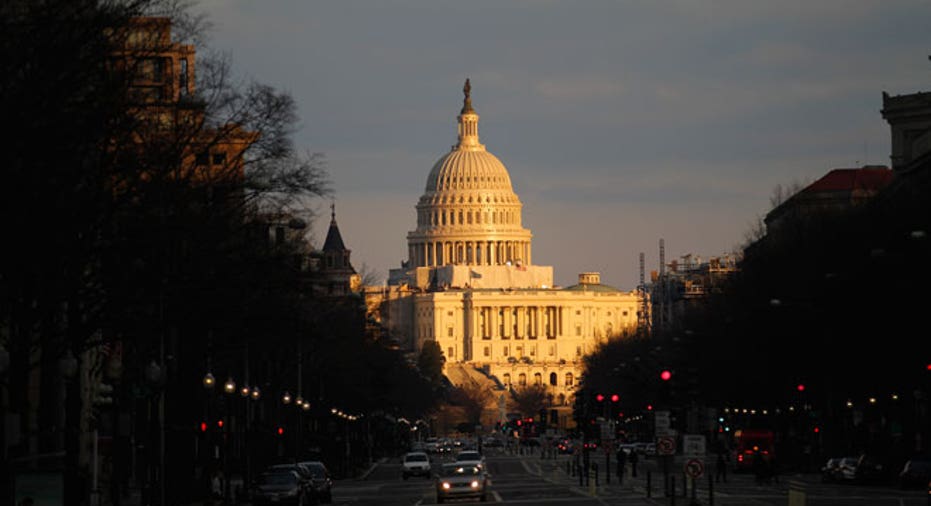Congress Defuses Bomb That it Built

Myopic stock investors, apparently relieved that a measure of uncertainty has been lifted from the markets, are cheering the tax deal that -- temporarily at least -- prevents the U.S. from falling over the so-called fiscal cliff.
The Dow Jones Industrial average surged higher Wednesday, closing up 308 points.
But much like many members of Congress -- quite a few of whom are acting as if the last-minute deal to raise taxes on wealthy Americans was an act of political heroism -- investors are reacting to an alternative narrative.
Under that substitute storyline the agreement reached early New Year's Day and hastily approved by both the Senate and the House of Representatives unfolded in much the same manner as a James Bond movie, with the hero saving the world from destruction at the last minute.
In this scenario heroic Congressmen saved the U.S. from across-the-board tax increases and Draconian mandated budget cuts, the combined impact of which was certain to throw the struggling U.S. economy back into recession.
The difference between a James Bond movie and Congressional reality, however, is that James Bond never builds the doomsday bombs he regularly defuses, and the super villains he battles in each new 007 installment are not himself.
By repeatedly putting off any hard decisions on America’s long-term fiscal problems Congress and President Obama created the crisis that became the fiscal cliff. Instead of working on solutions, both sides have attempted to use the issue for political leverage, leaving U.S. tax payers and businesses twisting in the wind.
On Wednesday, investors who were understandably nervous about the U.S. falling over the fiscal cliff are now relieved that’s apparently not going to happen. But the market "relief" rally is sure to be temporary once investors survey the economic landscape and realize the agreement changes very little.
Consider a note issued to clients by economists at J.P. Morgan Chase (NYSE: JPM) which says the agreement “imposes considerable near-term headwinds to growth while doing very little to address longer-run fiscal sustainability issues.” The bank predicted the deal will cost the U.S. economy 1 percentage point of GDP growth this year.
Then there are the figures released Tuesday by the Congressional Budget Office (CBO): the CBO said the deal, which raises taxes on household incomes over $450,000 and extends tax breaks for many business and energy-related ventures, will add nearly $4 trillion to the U.S. deficit over the next 10 years.
Moreover, the deal merely delays for two month the automatic budget cuts known as sequestration that would slash about 9% from the defense budget as well as myriad social and educational programs.
Deal Ignores Long-Term Fiscal Problems
And the agreement simply ignored such major issues as long-term corporate tax reform, rising health care costs, and most importantly perhaps entitlement spending on such popular programs as Social Security and Medicare.
The irony is that the whole point nearly two years ago of establishing a Jan. 1, 2013 deadline (which came to be known as the fiscal cliff) was to set a date by which Congress and the White House would address those long-term issues, and at the same time also create serious consequences that would serve as motivation for getting something significant done.
Instead, Congress and the White House dragged their feet, all the while bickering and finger pointing, then cobbled together a last-minute deal that only serves to avert the worst of the consequences Congress itself endorsed in the summer of 2011 to serve as motivation.
Some of our elected officials seem to be looking at the bigger picture.
Sen. Bob Corker, (R-Tenn.), voted in favor of the deal but a short time later issued a statement calling for additional measures to rein in government spending long-term and address long-overdue entitlement reform.
“Passing fundamental entitlement reform is the most important action we can take in ensuring our country’s solvency and now we must have the courage to finish the job and make the tough choices necessary to get these problems behind us once and for all,” said Corker.
Looking ahead to the looming battle over raising the U.S. debt limit, Corker has proposed lifting the ceiling by about $1 trillion and offsetting that by $1 trillion in spending cuts brought about by reforms to Medicare, Medicaid and Social Security.
Not surprisingly, the bipartisan leaders of a commission created in 2010 to address these same long-term fiscal reforms expressed frustration with the deal. Former Senator Alan Simpson, a Republican, and Erskine Bowles, a Democrat who served as chief of staff for President Bill Clinton, called the negotiations and final legislation “a missed opportunity.”
“Washington missed this magic moment to do something big to reduce the deficit, reform our tax code and fix our entitlement programs,” the two said in a statement.
The efforts of the Simpson-Bowles Commission, which produced arguably the most comprehensive and plausible mix of tax increases and spending cuts for reining in the bloated federal deficit, were also stymied by bipartisan political jockeying.
So the two men couldn’t have been very surprised by the all-too-predictable results of the drawn out fiscal cliff negotiations.



















